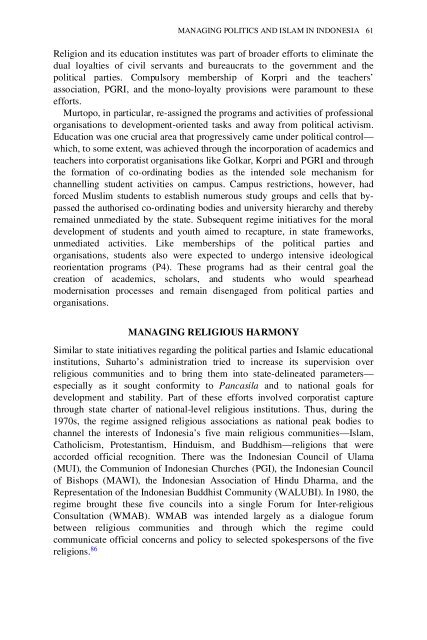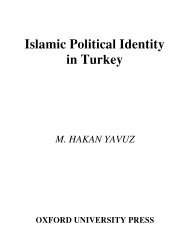You also want an ePaper? Increase the reach of your titles
YUMPU automatically turns print PDFs into web optimized ePapers that Google loves.
MANAGING POLITICS AND ISLAM IN INDONESIA 61Religion <strong>and</strong> its education <strong>in</strong>stitutes was part of broader efforts to elim<strong>in</strong>ate thedual loyalties of civil servants <strong>and</strong> bureaucrats to the government <strong>and</strong> thepolitical parties. Compulsory membership of Korpri <strong>and</strong> the teachers’association, PGRI, <strong>and</strong> the mono-loyalty provisions were paramount to theseefforts.Murtopo, <strong>in</strong> particular, re-assigned the programs <strong>and</strong> activities of professionalorganisations to development-oriented tasks <strong>and</strong> away from political activism.Education was one crucial area that progressively came under political control—which, to some extent, was achieved through the <strong>in</strong>corporation of academics <strong>and</strong>teachers <strong>in</strong>to corporatist organisations like Golkar, Korpri <strong>and</strong> PGRI <strong>and</strong> throughthe formation of co-ord<strong>in</strong>at<strong>in</strong>g bodies as the <strong>in</strong>tended sole mechanism forchannell<strong>in</strong>g student activities on campus. Campus restrictions, however, hadforced Muslim students to establish numerous study groups <strong>and</strong> cells that bypassedthe authorised co-ord<strong>in</strong>at<strong>in</strong>g bodies <strong>and</strong> university hierarchy <strong>and</strong> therebyrema<strong>in</strong>ed unmediated by the state. Subsequent regime <strong>in</strong>itiatives for the moraldevelopment of students <strong>and</strong> youth aimed to recapture, <strong>in</strong> state frameworks,unmediated activities. Like memberships of the political parties <strong>and</strong>organisations, students also were expected to undergo <strong>in</strong>tensive ideologicalreorientation programs (P4). These programs had as their central goal thecreation of academics, scholars, <strong>and</strong> students who would spearheadmodernisation processes <strong>and</strong> rema<strong>in</strong> disengaged from political parties <strong>and</strong>organisations.MANAGING RELIGIOUS HARMONYSimilar to state <strong>in</strong>itiatives regard<strong>in</strong>g the political parties <strong>and</strong> <strong>Islam</strong>ic educational<strong>in</strong>stitutions, Suharto’s adm<strong>in</strong>istration tried to <strong>in</strong>crease its supervision overreligious communities <strong>and</strong> to br<strong>in</strong>g them <strong>in</strong>to state-del<strong>in</strong>eated parameters—especially as it sought conformity to Pancasila <strong>and</strong> to national goals fordevelopment <strong>and</strong> stability. Part of these efforts <strong>in</strong>volved corporatist capturethrough state charter of national-level religious <strong>in</strong>stitutions. Thus, dur<strong>in</strong>g the1970s, the regime assigned religious associations as national peak bodies tochannel the <strong>in</strong>terests of <strong>Indonesia</strong>’s five ma<strong>in</strong> religious communities—<strong>Islam</strong>,Catholicism, Protestantism, H<strong>in</strong>duism, <strong>and</strong> Buddhism—religions that wereaccorded official recognition. There was the <strong>Indonesia</strong>n Council of Ulama(MUI), the Communion of <strong>Indonesia</strong>n Churches (PGI), the <strong>Indonesia</strong>n Councilof Bishops (MAWI), the <strong>Indonesia</strong>n Association of H<strong>in</strong>du Dharma, <strong>and</strong> theRepresentation of the <strong>Indonesia</strong>n Buddhist Community (WALUBI). In 1980, theregime brought these five councils <strong>in</strong>to a s<strong>in</strong>gle Forum for Inter-religiousConsultation (WMAB). WMAB was <strong>in</strong>tended largely as a dialogue forumbetween religious communities <strong>and</strong> through which the regime couldcommunicate official concerns <strong>and</strong> policy to selected spokespersons of the fivereligions. 86




